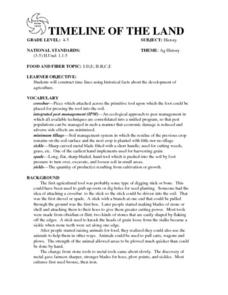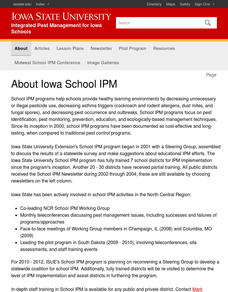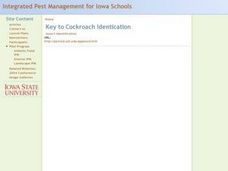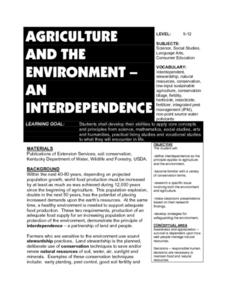Cornell University
What is IPM?
Discover what a pest is and how to identify one with a lesson that looks closely at our outside world and taxonomy. Scholars investigate insects and plants to practice their identification skills, take a survey, and explore the...
Curated OER
Integrated Pest Management
Students investigate the different methods used in integrated pest management. In this biology lesson, students evaluate experiments and case studies on IPM. They discuss the pros and cons of using this method.
Cornell University
Field Day: Be an IPM Detective
Become a pest detective! Individually or in small groups, scholars scout the land to discover which pests—plant and animal—inhabit it, determine whether the pests are endangering the environment, and summarize their findings.
Michigan State University
What is IPM?
Learners view a plastic cockroach, mouse, or picture of a pest and discuss if they belong inside the house or school. They discuss what a pest is and brainstorm what makes it a pest and ways to get rid of them. They then discover dangers...
Cornell University
Let’s Raise Lacewings
Young entomologists explored beneficial insects and how they help control pests in the first lesson of the series. Now class members take a close look at the lacewing, which is a beneficial insect.
Curated OER
Organic Farming / Agriculture
Want an organic farming resource packed with experiments, background information, science fair projects, and topics of interest for further research? Here it is. Young environmental scientists can explore concepts involved in organic...
Cornell University
Insect IPM
Find out the characteristics that makes a bug an insect with a workbook designed to inform scholars about the crawly creatures that live around us. Scholars complete an ant-themed word search, answer questions using a solution key, and...
Cornell University
Weed IPM
Go on a weed hunt! Scholars gain insight into the characteristics of plants and examine the outdoor environment in order to identify five different types of weeds. Learners then show what they know with a one-page reflection.
Curated OER
Mouthpart Madness
Students explore the basic biology of a pest. They identify the four major kinds of insect mouthparts and explain how they work. Students examine the specific mouthparts and how they can limit food resources and in what environment an...
Curated OER
Integrated Pest Management
Students compare and contrast the role of the honeybee in nature. They find information by using a variety of resources that could include the internet. Students take part in a paper and pencil formal evaluation with questions that...
Curated OER
Duck, Duck, GOOSE!
Students examine the migratory cycle of Canada geese, and explore the reasons that some birds have stopped migrating and become residents of an area. They identify the ways which geese are considered pests and explore ways to control...
Curated OER
Web of Life
Students construct a web of life. In this ecosystem lesson students are introduced to ecosystems and life cycles. Insects are the main focus.
Curated OER
Pest Populations: A Game of Survival
Students identify and classify populations of pests in the home, school and community. They recognize the specific conditions needed for the survival of an organism considered a pest and list tactics for control measures.
Curated OER
Hopper Hunt: IPM Decision-making in Alfalfa
Learners describe migrations and life cycle pattersn of a key alfalfa pest, the Porato Leafhopper. They define the Economic Inquiry Level and Economic Threshold. Students evaluate data in relation to profit as it applies to IPM. They...
Curated OER
What is a Pest?
Students investigate whether rabbits should be considered pests even though they make good pets. They extend this to determine what, when, and where other organisms are considered to be pests, and examine why the concept of a pest is a...
Curated OER
Arthropod Key
Young scholars identify the types of pests and categorize them. They identify their food chain and create a poster showing the food chain for the pests.
Curated OER
TIMELINE OF THE LAND
Learners construct time lines using historical facts about the development of agriculture. Students research specific dates and events and report their findings to the class. Learners tape or glue the sections together sequentially in a...
Curated OER
Ipm Pesticides And Regulations
Twelfth graders explore the process by which environmental laws and regulations are developed, passed, and enforced. They identify the major agency and office responsible for enforcing pesticide legislation and research the laws that...
Curated OER
PESTICIDES AS CHEMICAL TOOLS IN IPM
Tenth graders explore the importance of pesticides as chemical tools. The chemistry of a pesticide is important for understanding the composition of the product, the classification of pesticides according to their use and the...
Curated OER
Bug Time
Students identify basic pest they find in the school yard. They discover and examine pest control. They also explain the benefits and risks of pests. High school students present a short lesson to third graders.
Curated OER
Create a Soil Aggregate
Students simulate the conditions which occur in a soil aggregate. They explain how IPM affects the environment. They identify the cast of characteristics to develop their aggregate.
Curated OER
Pesticides in Schools
Students investigate the practices their school uses for pest control. Depending on their findings, students may suggest alternative, non-chemical methods. They present a pest control plan to school officials. Great, real life lesson!
Curated OER
Environment: Insects and Pesticides
Students classify bugs as pest or non-pests and identify ways to control them. They also examine the three levels of pesticides by reading the labels. Students complete charts of signal words on pesticide labels.
Curated OER
Agriculture and the Environment
Students investigate the interdependence of agriculture and the environment. They research areas of interdependence and provide examples of situations where farmers are practicing conservation in the local area. Their findings are...

























